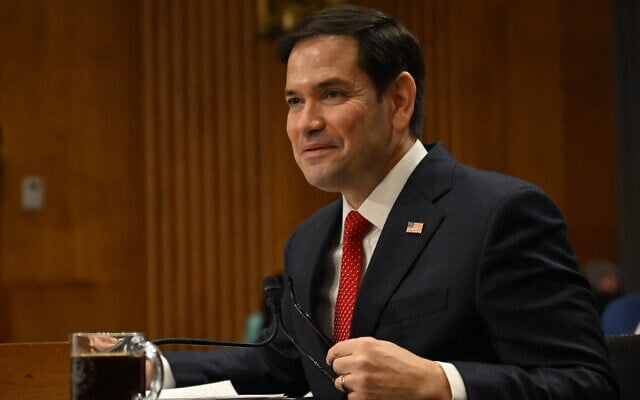



US President-elect Donald Trump’s nominee for secretary of state, Senator Marco Rubio of Florida, revealed Wednesday that the incoming administration will end the sanctions regime that the Biden administration rolled out last year against violent Israeli settlers.
The sanctions were unveiled amid mounting US frustration over Israel’s failure to crackdown on rampant settler violence targeting Palestinians throughout the West Bank. Seventeen individuals and 16 entities were designated in eight batches of sanctions imposed since February 2024. A handful of other Western countries have joined the US in implementing such sanctions, which have been the subject of criticism among the Israeli far-right.
Rubio was asked at his confirmation hearing before the Senate Foreign Relations Committee whether the incoming administration will reverse the policy, which US President Joe Biden introduced via executive order.
“Yes,” Rubio responded before adding, “Without speaking out of turn, I’m confident in saying that President Trump’s administration will continue to be perhaps the most pro-Israel administration in American history.”
Rubio did not provide a timeline for the sanction reversal, which an Israeli official speaking to The Times of Israel last month speculated could be used as leverage by the Trump administration in its ties with Jerusalem. Trump himself has not publicly commented on whether he will rescind the order.
Rubio was also asked whether the Trump administration will cease the policy of granting waivers that allow Palestinian Authority officials to hold political meetings in Washington. Rubio responded in the affirmative.
Republican Senator Ted Cruz of Texas asked whether Rubio will commit “to ending discriminatory policies, including Biden administration secret boycott policies against Jews in Judea and Samaria [West Bank].” Cruz did not elaborate on what he was referring to. Biden’s first ambassador Tom Nides visited a West Bank settlement during his tenure. The administration did maintain a de facto boycott of far-right minister Itamar Ben Gvir and Bezalel Smotrich — who US officials considered sanctioning under Biden’s executive order before ultimately deciding not to as Trump could swiftly reverse the move — but did so in order to avoid legitimizing their extremist views and not because they are settlers.
Regardless, Rubio also responded to Cruz’s question in the affirmative.
Rubio vowed in the hearing that strong US support for Israel would continue and backed the diplomacy that reached the Gaza hostage-ceasefire deal, which senators learned about during the five-hour hearing.
He also issued a fiery denunciation of Hamas, whose terror atrocities against Israel in October 2023 sparked the 15 months of fighting in the Gaza Strip that the multiphase deal signed Wednesday is meant to end.
“How can any nation-state on the planet coexist side by side with a group of savages like Hamas?” Rubio said.
The Florida senator hit out at the International Criminal Court over the ongoing “genocide” case against Israel over the war in Gaza, slamming the “moral equivalency” created between Hamas and the Jewish state.
“I think the ICC, if they don’t drop this, will find its credibility globally badly damaged and I think the United States should be very concerned, because I believe this is a test run for applying it to American service members and American leaders in the future,” he said.
In response to a question about Iran, Rubio vowed that Tehran’s obtainment of nuclear weapons “cannot be allowed under any circumstances.”
“Any concessions we make to the Iranian regime we should anticipate that they will use as they have used in the past to rebuild their weapons and to try to restart their sponsorship of Hezbollah and other related entities around the region because they seek to become the dominant regional power,” Rubio said. “That’s their stated goal and its been clear by the actions that they’ve taken.”
Agencies and Times of Israel staff contributed to this report.


